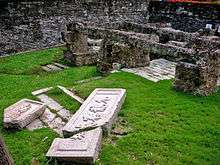Li Long Lam
| Li Long Lam | |||||||
|---|---|---|---|---|---|---|---|
| Citizenship | Hongkonger | ||||||
| Fields | Hong Kong Archaeology | ||||||
| Institutions | Hong Kong Antiquities and Monuments Office | ||||||
| Education |
Jilin University (Ph.D.) University of London (M.A.) Wuhan University (B.H.) | ||||||
| Doctoral advisor | Zhang Zhongpei | ||||||
| Chinese name | |||||||
| Chinese | 李浪林 | ||||||
| |||||||
Li Long Lam is an archaeologist in Hong Kong. Graduated with a Bachelor of History at Wuhan University, he later received his master's degree at the University of London and his Doctor of Philosophy in Archaeology at Jilin University. He is currently an Assistant Curator at the Hong Kong Antiquities and Monuments Office,[1] as well as a visiting professor at University of Chinese Academy of Sciences.[2] He is also a member of Hong Kong Archaeological Society.[3]
Academic Research

Li is famous for his study in Hong Kong pre-modern salt industry. Back in the 20th Century, there had been numerous sites of industry excavated along Hong Kong coast line. The sites were believed to be lime or ceramic kilns by that time. Li was the first to argue that a number of sites are not kilns but stoves to produce salt.[4] His argument alters the understanding of Hong Kong economic status in fifth to tenth Century Southeast Asia and eventually earned him a seat at the University of Chinese Academy of Sciences.[5][6]
Li also participated in multiple important excavations, including the Kowloon Walled City excavation in 1994,[7] the Tai Fu Tai Mansion project in 2001,[8] a widely concerned Mong Kok excavation in 2004,[9][10][11] and the Chi Ma Wan excavation.[12]
References
- ↑ Hong Kong Government Directory
- ↑ Official Site of the University of Chinese Academy of Science
- ↑ 2014年11月1日及8日中文大學人類學系考古課參觀考古學會
- ↑ Li Longlam, "Discovery and Studies on Hong Kong Raised Beaches and Saltwork Stoves Remains", Yen-Ching Journal (Yanjingxuebao), Vol. 24, May 2008.
- ↑ Discovery and Implication of Hong Kong Coastal Saltwork Stoves Remains (香港沿海煮盐炉遗址的发现及其意义), The Institute of Archaeology, CASS
- ↑ Archaeological Discoveries and Studies on Raised Beaches and Saltwork Stoves in Hong Kong, Institute of Archaeology, Academy of Chinese Social Sciences, 2008.
- ↑ Li Longlam, "Excavation Report of Kowloon Walled City, Hong Kong(香港九龙寨城发掘简报)" in Archaeology (Kaogu), vol. 6, 2007.
- ↑ Excavation of Wen Tianxiang's descendants' former residence, Ti Fu Tai: in search of former garden(文天祥后人故居大夫第考古挖掘-寻昔日花园)" Epoch Times, 19/05/2001
- ↑ "Over hundred relics excavated in Mong Kok, Western Han pottery pot almost used in reclamation(旺角地盤再掘出逾百件古物 西漢陶罐險填海)" The Sun (Hong Kong), 11/05/2004
- ↑ Evidence of ancient lime-kiln factory, China Daily, 11/5/2004.
- ↑ Hong Kong: Prekinuta gradnja jer arheolozi traže zakopano blago
- ↑ Archaeological Impact Assessment for Redevelopment of Chi Ma Wan Prison Area, Lantau Island, Antiquities and Monuments Office, 2009